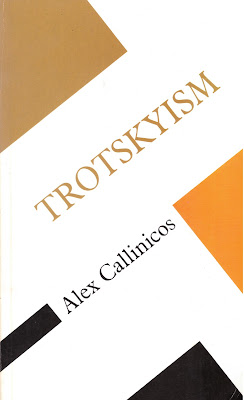Callinicos begins his study of Trotskyism by placing it in the context of Leon Trotsky's life and revolutionary work. Trotsky was a leading figure in the Russian Revolution, an experienced revolutionary activist and a Marxist author. The key question for Trotsky, and his followers, was the nature of the Soviet Union in the era after the rise of Stalin (and by implication the defeat of Trotsky). Trotsky's argument that the Soviet Union was a degenerated workers state shaped both theory and practice. In the aftermath of Trotsky's death and the expansion of the Soviet Union's sphere of influence into Europe this posed a question for the movement. How to reconcile this with the central tenet of Marxism, which Trotsky himself had fought for to the end - that socialism was about workers' self-emancipation. As Callinicos says:
The post-war transformaton of Eastern Europe by the USSR in its own likeness presented Trotsky's heirs with the following dilemma: to abandon his identification of the overthrow of capitalism with state ownership of the means of production or to revise the classical Marxist conception of socialist revoution as 'the self-conscious indpedent movement of the immense majority, in the interest of the immense majority. 'Orthodox Trotskyism', as [US Trotskyist James P.] Cannon was the first to call it, consisted in taking the second horn of this dilemma.
Attempting to grapple with the implications of this led to a process of disagreement and then division among the revolutionary movement. As Callinicos notes one of the features of the Trotskyist movement is its tendency to split, but he argues that this arises out of the nature of the movement's politics. About the early post-war decades he writes:
This process of fragementation... should not conceal the fact that the parties ot the various disputes shared certain crucial assumptions, in particular the belief that the USSR, CHina and Eastern Europe had broken with capitalism and begun, albeit in a bureaucratically deformed manner, the transition to socialism. These assumption give orthodox Trotskyism certain essential features which underline, and help explain, its infinite sectarian differences.
But, "by seeking to preserve the letter of Trotsky's theory, [orthodox Trotskism] deprived the latter of much of its substance". History would repeatedly demonstrate that the USSR, China and Eastern Europe were not socialist, and certainly didn't act in the interests of the working class. This in itself was enough to derail many individuals and groups. More problematic was the problems it caused for understanding "the agency of socialist revolution". For some Trotskyists, Callinicos argued, the contradictions led them to abandon revolution, with Marxism and Trotskyism becoming a realm of academic debate or historical books. Isaac Deutscher being a prime example of this problem.
For other Trotskyists the failure to be clear on the historic role of the working class led to them championing other movements, or other non-working class revolutions as being the alternative. Still other Trotskyists moved to the right and became their own enemies. A minority of Trotskyists however took the brave path of trying to take the core revolutionary ideas of Trotsky and reintegrate them with a new analysis of the Soviet Union. First and foremost among these, for both myself and Callinicos, was Tony Cliff's approach which culminated in his theory of State Capitalism. Cliff's break with orthodox Trotskyism began after doubt was cast on Trotsky's idea of the USSR as a degenerated workers' state. It was able to develop and flourish because Cliff held onto that central Marxist idea of workers' self-emancipation. The rest is, Trotskyist history.
Callinicos' book remains an interesting and important study of the movement. It is, nonetheless, a product of its time. Today Trotskyism is in many senses weaker than in 1990. Written in the aftermath of the fall of the Berlin Wall, the hope for a renewed revolutionary politics untainted by Stalinism remains in these pages. But the development of the organisations that could lead that has been stunted. In part this is because of the lack of working class struggle during the intervening years. Its hard to orientate a political organisation on the working class if that class is only fighting intermitently. Nonetheless there are some signs of life, and the clarity of Trotskyist analysis remains far superior to that of other left, and Stalinist groups. That said one of the key ideas of Trotsky - that of the United Front - which remains a crucial tactic even during periods when there are limited workers' struggles, does not feature much in the book. Perhaps this is a reflection of the period, but it is perhaps something that contemporary readers will find missing.
Callinicos points out in his introduction that the book is coloured by his own knowledge and experience, which means that there are areas of the Trotskyist movement (in Asia and South America for instance) that aren't covered in enough detail. However this short book remains of great interest and, with its central discussion on Trotsky's legacy and what it means for revolutionaries, I has a lot to offer comrades today.
Related Reviews

No comments:
Post a Comment